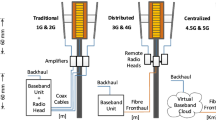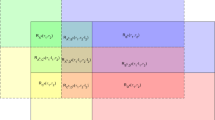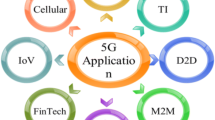Abstract
This paper studies a coded cooperation scheme with receive multi-antenna in the destination. A kind of simple-encoding irregular systematic low-density-parity-check (LDPC) codes is applied to the scheme. For Rayleigh block fading channels, in the unknown channel state information scenario, space-based adaptive least-mean square (LMS) transversal filters are adopted in the destination to realize receive diversity gain. The filtered signals from the source and relay are decoded by a joint “Min-Sum” iterative decoding algorithm. This algorithm agrees with the bilayer Tanner graph that can be used to fully characterize two distinct irregular systematic LDPC codes employed by the source and relay. Simulation results verify the effectiveness of the space-based adaptive LMS transversal filters in the coded cooperation scheme. Meanwhile, theoretical analysis and numerical simulation show that the proposed coded cooperation scheme can well combine cooperation diversity, multi-receive diversity and channel coding gains, and clearly outperforms the coded non-cooperation one under the same conditions.












Similar content being viewed by others
References
Laneman, J., Tse, D., & Wornell, G. (2004). Cooperative diversity in wireless networks: Efficient protocols and outage behavior. IEEE Transactions on Information Theory, 50(12), 3062–3080.
Sendonaris, A., Erkip, E., & Aazhang, B. (2003). User cooperation diversity part I: System description. IEEE Transactions on Communications, 51(11), 1927–1938.
Sendonaris, A., Erkip, E., & Aazhang, B. (2003). User cooperation diversity part II: Implementation aspects and performance analysis. IEEE Transactions on Communications, 51(11), 1939–1948.
Laneman, J., Wornell, G., & Tse, D. (2001). An efficient protocol for realizing cooperative diversity in wireless networks. In Proceedings IEEE international symposium on information theory 2001, Washing DC, U.S.A., 294–297.
Cover, T., & Gamal, A. (1979). Capacity theorems for the relay channel. IEEE Transactions on Information Theory, 25(5), 572–584.
Su, W., Sadek, A., & Liu, K. J. R. (2008). Cooperative communication protocols in wireless networks: Performance analysis and optimum power allocation. Wireless Personal Communications, 44(2), 181–217.
Larsson, E. G., & Vojcic, B. R. (2005). Cooperative transmit diversity based on superposition modulation. IEEE Communications Letters, 9(9), 778–780.
Xiao, L., Fuja, T. E., Kliewer, J., & Costello, D. J., Jr. (2007). A network coding approach to cooperative diversity. IEEE Transactions on Information Theory, 53(10), 3714–3722.
Rossi, P. S., Petropulu, A. P., Palmieri, F., & Iannello, G. (2007). Distributed linear block coding for cooperative wireless communications. IEEE Signal Processing Letters, 14(10), 673–676.
Rossi, P. S. (2010). On the performance of cooperative systems with distributed linear block coding. Physical Communication, 3(2), 81–86.
Hunter, T. E. (2004). Coded cooperation: A new framework for user cooperation in wireless network. Ph.D Thesis, The university of Texas at Dallas.
Janani, M., Hedayat, A., Hunter, T. E., & Nosratinia, A. (2004). Coded cooperation in wireless communications: Space-time transmission and iterative decoding. IEEE Transactions on Signal Processing, 52(2), 362–371.
Hunter, T. E., & Nosratinia, A. (2006). Diversity through coded cooperation. IEEE Transactions on wireless Communications, 5(2), 283–289.
Hunter, T. E., Sanayei, S., & Nosratinia, A. (2006). Outage analysis of coded cooperation. IEEE Transactions on Information Theory, 52(2), 375–391.
Zhang, Z., & Duman, T. M. (2005). Capacity-approaching turbo coding and iterative decoding for relay channels. IEEE Transactions on Communications, 53(11), 1895–1905.
Chakrabarti, A., Baynast, A. D., Sabharwal, A., & Aazhang, B. (2007). Low density parity check codes for the relay channel. IEEE Journal of Selected Areas in Communications, 25(2), 580–291.
Li, C., Yue, G., Khojastepour, M. A., & Madihian, M. (2008). LDPC-code cooperative relay systems: Performance analysis and code design. IEEE Transactions on Communications, 56(3), 485–496.
Gallager, R.G. (1963). Low density parity check codes. Cambridge, Mass: MIT Press.
Berrou, C., & Glavieux, A. (1996). Near optimum error correcting coding and decoding: Turbo-codes. IEEE Transactions on Communications, 44(10), 1261–1271.
Li, Y., Song, G., & Wang, L. (2010). Analysis of the joint network LDPC codes over orthogonal multi-access relay channel. IEEE Communications Letters, 14(2), 184–186.
Li, J., Yuan, J., Malaney, R., Azmi, M. H., & Xiao, M. (2011). Network coded LDPC coded design for a multi-source relaying system. IEEE Transactions on Wireless Communications, 10(5), 1538–1551.
Gao, F., Zhang, R., & Liang, Y. (2009). Optimal channel estimation and training design for two-way relay networks. IEEE Transactions on Communications, 57(10), 3024–3033.
Han, S., Ahn, S., Oh, E., & Hong, D. (2009). Effect of channel-estimation error on BER performance in cooperative transmission. IEEE Transactions on Vehicular Technology, 58(4), 2083–2088.
Jiang, B., Gao, F., Gao, X., & Nallanathan, A. (2010). Channel estimation and training design for two-way relay networks with power allocation. IEEE Transaction on Wireless Communications, 9(6), 2022–2032.
Ikki, S., & Aissa, S. (2012). Impact of imperfect channel estimation and co-channel interference on dual-hop relaying systems. IEEE Communications Letters, 16(3), 324–327.
Deng, Q., Machado, R. G., & Klein, A. G. (2012). Adaptive channel estimation in decode and forward relay networks. In 46th Annual conference on information and sciences and systems, pp. 1–6.
Ali, R. L., Khan, S. A., Ali, A., Rehman, A., & Malik, S. A. (2012). A robust least mean square algorithm for adaptive array signal processing. Wireless Personal Communications. doi:10.1007/s11277-012-0533-6.
Cattivelli, F. S., & Sayed, A. H. (2011). Analysis of spatial and incremental LMS processing for distributed estimation. IEEE Transactions on Signal Processing, 59(4), 1465–1480.
Zanella, A., Chiani, M., & Win, M. Z. (2011). Statistical analysis of steepest descend and LMS detection algorithm for MIMO systems. IEEE Transactions on Vehicular Technology, 60(9), 4667–4672.
Barry, J. R., Lee, E. A., & Messerschmitt, D. G. (2004). Digital communication. Massachusetts: Kluwer.
Chen, J., Dholakia, A., Eleftheriou, E., Fossorier, M. R. C., & Hu, X. Y. (2005). Reduced complexity decoding of LDPC codes. IEEE Transactions on Communications, 53(8), 2083–2088.
Jamalabdollahi, M., & Salari, S. (2012). RLS-based estimation and tracking of frequency offset and channel coefficients in MIMO-OFDM systems. Wireless Personal Communications, doi:10.1007/s11277-012-0867-0.
Sayed, A. H., & Kailath, T. (1994). A state-space approach to adaptive RLS filtering. IEEE Signal Processing Magazine, 11(3), 18–60.
He, S., Shan, X., & Ren, Y. (2003). A new adaptive equalization scheme for MIMO channels. In Proceedings of the 3rd international symposium on image and signal processing and analysis, pp. 1028–1033.
Acknowledgments
This paper is supported by the Science and Technology on Avionics Integration Laboratory and National Aeronautical Science Foundation of China under the contract No.20105552, and funded by the Priority Academic Program Development of Jiangsu Higher Education Institutions. The authors wish to thank the editor and the anonymous reviewers for their valuable suggestions on improving this paper.
Author information
Authors and Affiliations
Corresponding author
Rights and permissions
About this article
Cite this article
Zhang, S., Yang, F., Tang, L. et al. LDPC-Coded Cooperation with Receive Multi-Antenna and Unknown CSI in the Destination. Wireless Pers Commun 72, 2685–2703 (2013). https://doi.org/10.1007/s11277-013-1174-0
Published:
Issue Date:
DOI: https://doi.org/10.1007/s11277-013-1174-0




